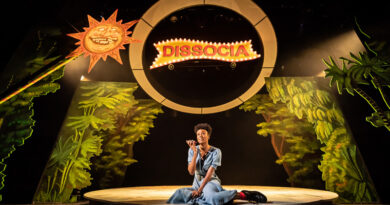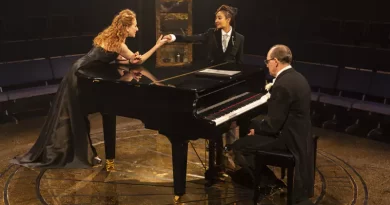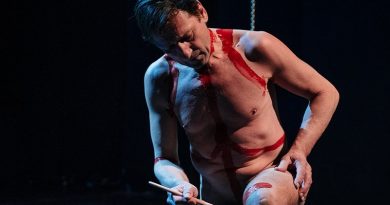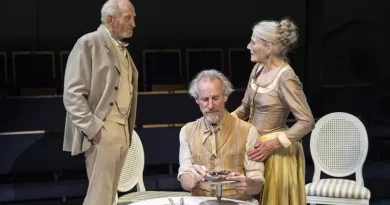“Who Killed My Father”, Young Vic
Jeremy Malies on the South Bank
12 September 2022
Who Killed My Father – the absence of a question mark makes the title as much a declaration as anything else – is an adaptation and translation of the Édouard Louis novel by Ivo van Hove who also directs. The last time van Hove was at the Young Vic in 2014 his non-naturalistic production of Arthur Miller’s A View from the Bridge won Olivier Awards for best revival, best actor (Mark Strong) and best director. Van Hove is on record as saying that there is no one way of being faithful to a text but you sense from the flow of the idiom here that his version of Louis’ episodic autobiographical novel-cum-memoir catches the tone of the original, particularly in the sequences where family and political injustices intersect.
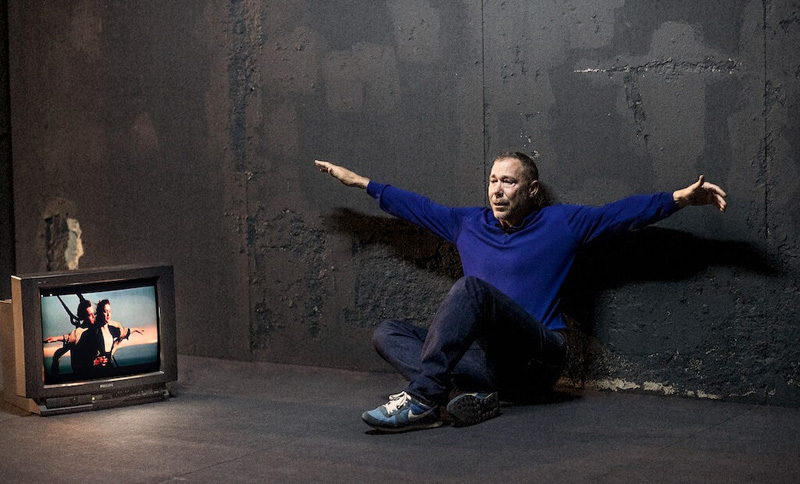
Hans Kesting as the speaker.
Photo credit: Jan Versweyveld.
The sole performer Hans Kesting is a core member of the Dutch repertory company Internationaal Theater Amsterdam which is led by van Hove. Kesting conjures up parents and friends with such facility that this monologue seems richly peopled. The conflict that propels us through a sombre 85 minutes is as much within the unseen father as between father and son. What angers the father more? The fact that his son is gay or that he is striving to gain an education? Kesting’s technical skill (the acting is staggering in its intensity, fluency and sense of spontaneity) takes us deep into the father’s mind.
In the novel, the speaker returns to his provincial town in northern France while his father, who has been crippled by an industrial accident, is still alive. Here, the father may have just died but Kesting addresses him throughout while also talking to his wiser self or alter ego. It’s a little like Krapp’s Last Tape with much discussion of missed opportunities and sins of omission though without Beckett’s occasional shafts of humour. Be assured, this play is a worthwhile evening, albeit gruelling with few laughs. On a sodden night, the audience had been deflated at curtain-up when a front-of-house manager told us that Her Majesty had died.
The son’s sexuality first dawns on the father when, as his playmates perform “Barbie Girl” by the Danish group Aqua, the boy opts to sing the part of a female vocalist. “Why do you behave like a girl? Can’t you stop?” The macho factory worker and the youth who is in touch with his feminine side are at an impasse. There may be nature vs nurture implications as we realize that the youth is unlikely to do manual work like just about every adult in his community but the discussions are never formulaic or predictable. Whatever the father may think of his son, he intuits that his boy is honest and defends him vehemently in a police station against a trumped-up charge after a squabble among children. For me, having had a similar experience when my (better-educated, less judgemental) Francophile father behaved in the same way, this was intensely moving.
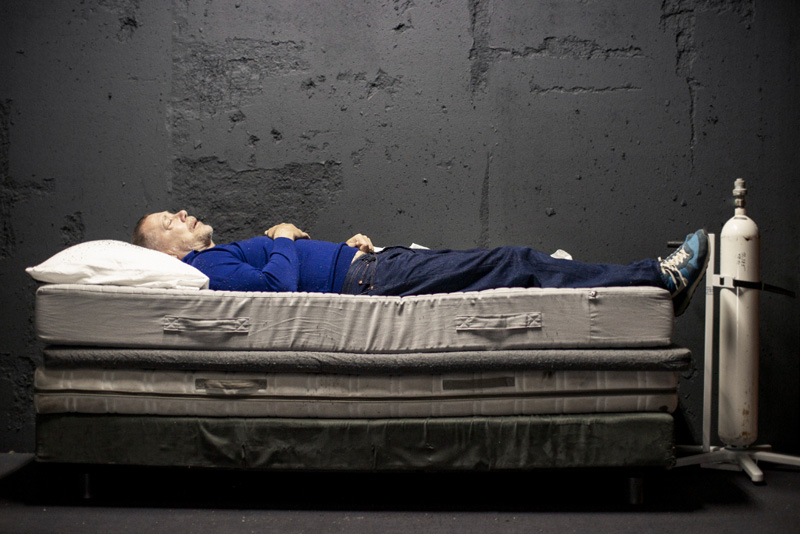
Hans Kesting as the speaker.
Photo credit: Jan Versweyveld.
We never know quite where we are physically because the play is “excipient” to its idea. That’s not my word – I had to look it up – and comes from Rebecca Frecknall’s perceptive programme essay. She is right that nothing here is prescribed, so much so that set design (by Jan Versweyveld) leaves it to us to guess at the location.
The stage is sparse containing a bed, a television, and an oxygen cylinder which might belong to father or son since they are both heavy smokers. We know that dents in the back wall are where the angst-ridden adolescent has punched it, but all these trappings may be in his mind’s eye. It’s a suitably abstract environment though we see footage of the film Titanic which was the speaker’s choice as an eighth birthday present as well as video of events on 9/11 much later. They are about the only splashes of colour in Versweyveld’s otherwise grey palette.
The meaning of the play’s title becomes more apparent as the house lights are brought up and Kesting’s character begins to address us directly or at least acknowledge our presence. All this is integrated into the overall structure with the text changing subtly to become a polemic that is so well crafted and compelling that it never degenerates into propaganda.
This section also offers a welcome acceleration of pace. The speaker details his father’s years of convalescence following an industrial accident after which the state cuts his benefits mercilessly and forces him back to work when he is unfit. His illness coincides with President Sarkozy’s crusade against perceived freeloaders, the so-called “assistés”. Successive French leaders dismantle the French welfare state and allow the prices of medication to spiral in a process that is little better than social Darwinism. Finally, we learn amid an ironic crescendo of “La Marseillaise” how the effects of this process, trickle-down economics on steroids, break the father’s will to live.
Louis’ original and van Hove’s translation are acerbic when claiming that political leaders think only of aesthetics. Their macroeconomics in the real world is just an extension of their university dissertations and probably receives even less thought. A few days into Liz Truss’s government, these sentiments had the audience totally onside. Our new leader is unlikely to have to make a “heat or eat” decision. It’s testimony to the quality of the novel and adaptation that the transition in tone and content here is never clunky.
At the end, the speaker seems near to death himself: “My body can no longer bear its own existence.” He tells us that we should seek to mould our parents rather than the other way round and, above all, we must – in Louis’ wonderful phrase – “avoid living on the outskirts of our life”. The final plea is that we should all calibrate delay of gratification with living our lives to the fullest. A delicate balance but sage advice.


